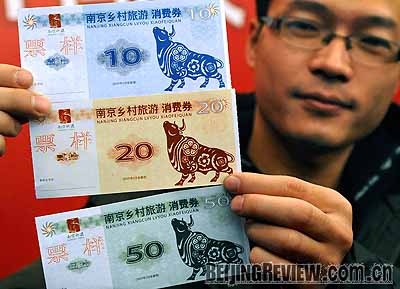| Protecting Tibetan Ecology
China's State Council, or the cabinet, approved a plan on February 18 to protect the ecological environment in Tibet Autonomous Region against climate change.
 |
|
FREE TOUR COUPON:The Government of Nanjing City in east China has delivered free coupons worth a total of 30 million yuan ($4.4 million) to 200,000 lucky urban households in a lottery. Recipients can spend them on tours in rural areas of the city (SUN CAN) | The regional government should place priority on environmental protection in Tibet, ensure the country's ecological safety and improve living conditions of farmers and herdsmen in the southwestern autonomous region, according to an executive meeting of the State Council.
According to the plan, China will strengthen pasture protection against desertification and help restore grasslands swallowed by sand. The country will also reinforce the preservation of wetlands and natural reserves, build up a shelter belt against gales and storms and work to increase forest coverage. Other environment-friendly measures include a project to promote the use of clean energy in farming and pasture regions, and a mechanism to strengthen supervision of Tibet's ecological system.
Publicizing Officials' Assets
Authorities in Altay Prefecture, northwest China's Xinjiang Uygur Autonomous Region, have publicly released a list of personal assets of more than 1,000 current and retired officials. This makes Altay a leading local government in publicizing their officials' assets, which the Central Government has advocated as an effective measure to curb corruption.
Altay, in north Xinjiang, asked 1,064 officials, including those who had retired within the past three years, to file asset reports during the first 20 days of January.
The information was submitted to the prefecture's discipline inspection committee of the Party, which on February 17 posted the data on its website.
Chinese officials began to declare their assets years ago, but the declarations have never been made public.
Water Shortages
China will tighten water resources management and take measures to reduce waste to cope with the worsening water shortage, Water Resources Minister Chen Lei said recently.
Water consumption averaged 229 cubic meters per 10,000 yuan ($1,471) worth of products, according to statistics provided by the Ministry of Water Resources at the end of 2008. That figure was down 10 percent compared with the previous year.
Recently released statistics show the country lacks 40 billion cubic meters of water every year, with almost two thirds of cities suffering various degrees of water shortage.
More than 200 million rural people face drinking water shortages. At the same time, farmland affected by drought reaches 15.3 million hectares every year, nearly 13 percent of the total farming area.
Graduate Trainees
China will launch a graduate trainee program for 1 million unemployed college graduates in three years, according to a circular issued by the General Office of the State Council on February 15.
| 